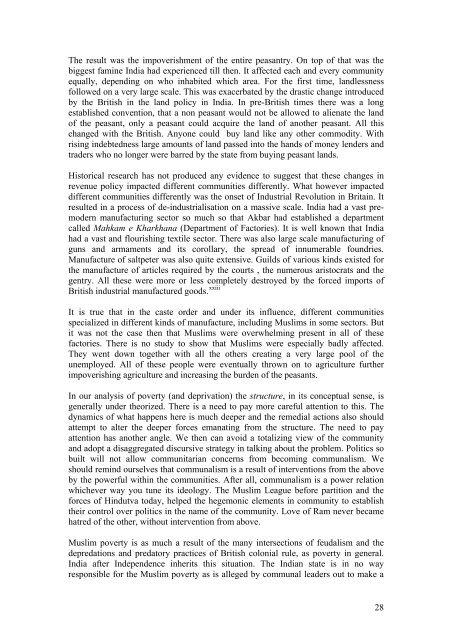Living on the Margins. Minorities in South Asia - EURAC
Living on the Margins. Minorities in South Asia - EURAC
Living on the Margins. Minorities in South Asia - EURAC
- TAGS
- minorities
- eurac
- www.eurac.edu
You also want an ePaper? Increase the reach of your titles
YUMPU automatically turns print PDFs into web optimized ePapers that Google loves.
The result was <strong>the</strong> impoverishment of <strong>the</strong> entire peasantry. On top of that was <strong>the</strong><br />
biggest fam<strong>in</strong>e India had experienced till <strong>the</strong>n. It affected each and every community<br />
equally, depend<strong>in</strong>g <strong>on</strong> who <strong>in</strong>habited which area. For <strong>the</strong> first time, landlessness<br />
followed <strong>on</strong> a very large scale. This was exacerbated by <strong>the</strong> drastic change <strong>in</strong>troduced<br />
by <strong>the</strong> British <strong>in</strong> <strong>the</strong> land policy <strong>in</strong> India. In pre-British times <strong>the</strong>re was a l<strong>on</strong>g<br />
established c<strong>on</strong>venti<strong>on</strong>, that a n<strong>on</strong> peasant would not be allowed to alienate <strong>the</strong> land<br />
of <strong>the</strong> peasant, <strong>on</strong>ly a peasant could acquire <strong>the</strong> land of ano<strong>the</strong>r peasant. All this<br />
changed with <strong>the</strong> British. Any<strong>on</strong>e could buy land like any o<strong>the</strong>r commodity. With<br />
ris<strong>in</strong>g <strong>in</strong>debtedness large amounts of land passed <strong>in</strong>to <strong>the</strong> hands of m<strong>on</strong>ey lenders and<br />
traders who no l<strong>on</strong>ger were barred by <strong>the</strong> state from buy<strong>in</strong>g peasant lands.<br />
Historical research has not produced any evidence to suggest that <strong>the</strong>se changes <strong>in</strong><br />
revenue policy impacted different communities differently. What however impacted<br />
different communities differently was <strong>the</strong> <strong>on</strong>set of Industrial Revoluti<strong>on</strong> <strong>in</strong> Brita<strong>in</strong>. It<br />
resulted <strong>in</strong> a process of de-<strong>in</strong>dustrialisati<strong>on</strong> <strong>on</strong> a massive scale. India had a vast premodern<br />
manufactur<strong>in</strong>g sector so much so that Akbar had established a department<br />
called Mahkam e Kharkhana (Department of Factories). It is well known that India<br />
had a vast and flourish<strong>in</strong>g textile sector. There was also large scale manufactur<strong>in</strong>g of<br />
guns and armaments and its corollary, <strong>the</strong> spread of <strong>in</strong>numerable foundries.<br />
Manufacture of saltpeter was also quite extensive. Guilds of various k<strong>in</strong>ds existed for<br />
<strong>the</strong> manufacture of articles required by <strong>the</strong> courts , <strong>the</strong> numerous aristocrats and <strong>the</strong><br />
gentry. All <strong>the</strong>se were more or less completely destroyed by <strong>the</strong> forced imports of<br />
British <strong>in</strong>dustrial manufactured goods. xxiii<br />
It is true that <strong>in</strong> <strong>the</strong> caste order and under its <strong>in</strong>fluence, different communities<br />
specialized <strong>in</strong> different k<strong>in</strong>ds of manufacture, <strong>in</strong>clud<strong>in</strong>g Muslims <strong>in</strong> some sectors. But<br />
it was not <strong>the</strong> case <strong>the</strong>n that Muslims were overwhelm<strong>in</strong>g present <strong>in</strong> all of <strong>the</strong>se<br />
factories. There is no study to show that Muslims were especially badly affected.<br />
They went down toge<strong>the</strong>r with all <strong>the</strong> o<strong>the</strong>rs creat<strong>in</strong>g a very large pool of <strong>the</strong><br />
unemployed. All of <strong>the</strong>se people were eventually thrown <strong>on</strong> to agriculture fur<strong>the</strong>r<br />
impoverish<strong>in</strong>g agriculture and <strong>in</strong>creas<strong>in</strong>g <strong>the</strong> burden of <strong>the</strong> peasants.<br />
In our analysis of poverty (and deprivati<strong>on</strong>) <strong>the</strong> structure, <strong>in</strong> its c<strong>on</strong>ceptual sense, is<br />
generally under <strong>the</strong>orized. There is a need to pay more careful attenti<strong>on</strong> to this. The<br />
dynamics of what happens here is much deeper and <strong>the</strong> remedial acti<strong>on</strong>s also should<br />
attempt to alter <strong>the</strong> deeper forces emanat<strong>in</strong>g from <strong>the</strong> structure. The need to pay<br />
attenti<strong>on</strong> has ano<strong>the</strong>r angle. We <strong>the</strong>n can avoid a totaliz<strong>in</strong>g view of <strong>the</strong> community<br />
and adopt a disaggregated discursive strategy <strong>in</strong> talk<strong>in</strong>g about <strong>the</strong> problem. Politics so<br />
built will not allow communitarian c<strong>on</strong>cerns from becom<strong>in</strong>g communalism. We<br />
should rem<strong>in</strong>d ourselves that communalism is a result of <strong>in</strong>terventi<strong>on</strong>s from <strong>the</strong> above<br />
by <strong>the</strong> powerful with<strong>in</strong> <strong>the</strong> communities. After all, communalism is a power relati<strong>on</strong><br />
whichever way you tune its ideology. The Muslim League before partiti<strong>on</strong> and <strong>the</strong><br />
forces of H<strong>in</strong>dutva today, helped <strong>the</strong> hegem<strong>on</strong>ic elements <strong>in</strong> community to establish<br />
<strong>the</strong>ir c<strong>on</strong>trol over politics <strong>in</strong> <strong>the</strong> name of <strong>the</strong> community. Love of Ram never became<br />
hatred of <strong>the</strong> o<strong>the</strong>r, without <strong>in</strong>terventi<strong>on</strong> from above.<br />
Muslim poverty is as much a result of <strong>the</strong> many <strong>in</strong>tersecti<strong>on</strong>s of feudalism and <strong>the</strong><br />
depredati<strong>on</strong>s and predatory practices of British col<strong>on</strong>ial rule, as poverty <strong>in</strong> general.<br />
India after Independence <strong>in</strong>herits this situati<strong>on</strong>. The Indian state is <strong>in</strong> no way<br />
resp<strong>on</strong>sible for <strong>the</strong> Muslim poverty as is alleged by communal leaders out to make a<br />
28

















